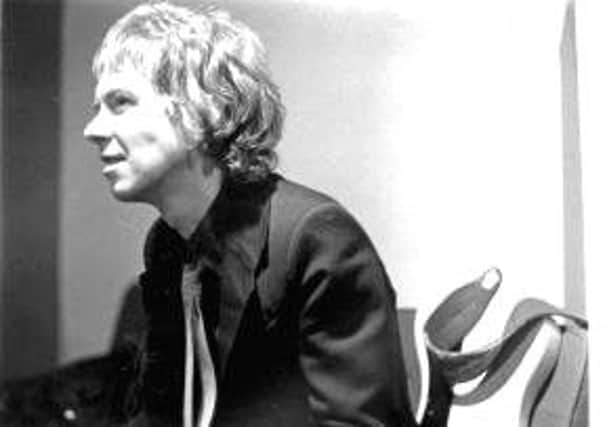Obituary: David McNiven, musician and composer


David McNiven was a Scottish musician and composer whose many disparate projects came together in a life’s work which was marked by diversity, adaptability, and a distinct sense of his contribution to significant chunks of Scottish culture. He recorded for Decca Records, home of the Rolling Stones, scored theatre productions for a number of Scotland’s most significant companies, and later moved into television and education.
For a brief couple of years at the turn of the 1970s McNiven was one third of Edinburgh folk-rock trio Bread, Love & Dreams alongside his later wife Angie Rew, who are remembered now more as a cult psychedelic act, despite being signed to Decca; in the 1980s he wrote music and plays for the political theatre company Wildcat; in the 80s and 90s he wrote music for Glasgow’s Comedy Unit, including the scores for hit shows Rab C Nesbitt and Naked Video. He also worked with Edinburgh’s Traverse Theatre Workshop and Royal Lyceum Young Company.
Advertisement
Hide AdAdvertisement
Hide AdBorn in Dennistoun, Glasgow, to Marion Tyrell, an accounts clerk for an electronics firm, and Ian McNiven, a sales manager for a chemical company, David Martin McNiven was an only child. Despite their occupations the family were musical, with a particular interest in Scottish folk; his mother played piano, his father played bagpipes, and McNiven was given a banjo at a young age by his grandmother.
Around the age of 12, he suffered an ear infection which kept him out of school, so his mother sent him to stay with a family friend who lived in Prestwick. The friend owned a café with a jukebox, on which American airmen stationed nearby would play early rock ’n’ roll records. The first one McNiven remembered hearing was Little Richard’s Tutti Frutti, and as he later told his wife, “my ears opened, and I could hear again.”
McNiven went to s the High School of Glasgow - where he was taught by the future broadcaster Donald McCormick and played clarinet in the school orchestra - and studied drama at the institution now known as the Royal Conservatoire of Scotland. He married his first wife Deborah, a fellow drama student, at a young age and they had two children together. Amidst more regular jobs like that of supplies manager at the local ironworks, he played the pubs of West Lothian as a duo with his friend Andrew Eadie, until McNiven’s marriage ended and he moved to Edinburgh.
It was here that he met Rew in the popular Cephas Youth Club in the basement of St George’s Church West, while they were both playing in music acts at the Edinburgh Festival. He was 23, she was a year younger, and a mutual friend thought that they would work well as a trio with Rew’s musical partner Carolyn Davis. McNiven and Rew didn’t start a relationship until a year later in 1969, when his marriage had finished, by which point the trio had founded Bread, Love and Dreams.
The group released their self-titled debut album in 1969. Although they played across the UK and toured to Germany and Belgium, the first record wasn’t a success and Davis left. McNiven and Rew continued with the albums The Strange Tale of Captain Shannon and the Hunchback from Gigha (1970) and Amaryllis (1971), before the group folded.
The couple moved into scoring short films about Scotland for Pelicula Films and work with the Traverse Theatre Company Workshop under Max Stafford Clark, touring to the Royal Court in London and abroad, and playing multiple shows at the Edinburgh Festival. Following this they moved to the Royal Lyceum’s young company in 1973, where McNiven set Shakespeare’s words to music for a version of A Midsummer Night’s Dream, wrote Cry Wolf alongside Sean McCarthy and scored William Grant’s If You Died with a Face Like That… The pair’s contemporaries here included Kenny Ireland and McNiven’s old friend Bill Patterson.
In 1976 they moved over to John McGrath’s political theatre company 7:84 and helped found its offshoot Wildcat in 1978 with the actor Dave Anderson. By 1990 McNiven had composed for 14 shows, including the writing or co-writing of The Complete History of Rock ’n’ Roll (1979), The Barmecide Feast (1980), Confessin’ the Blues (1981, for which he won a Fringe First) and The Importance of Being Honest (1987).
In the 1980s McNiven also provided musical direction for a young Edinburgh Festival revue company called A Sense of Nonsense, which featured a pre-fame Stephen Fry, Hugh Laurie and Emma Thompson. These connections led him for a brief time to take a job as a soundtrack composer with Granada television in Manchester, where his highest-profile project was working on the 1983-84 series Alfresco with the above trio alongside Robbie Coltrane, Ben Elton and Siobhan Redmond. Yet the commute from Edinburgh was too long for a man with a young third child, and he began travelling to Glasgow when the Comedy Unit job came up.
Advertisement
Hide AdAdvertisement
Hide AdUpset by the death of his mother at the start of the 2000s, McNiven stopped work for a while, and when he returned his focus had shifted towards music education for children with special needs. On behalf of a gifted student with cerebral palsy named Chris Jacquin he campaigned with the Scottish Qualifications Authority to amend exam rules, allowing special needs pupils to earn music qualifications. He also worked with the music and disability charity Drake Music, for whom the family are fundraising in his honour at justgiving.com (under DMcNivenMemorial).
Those who know him best remember David McNiven as a gentle, quiet man, who nonetheless was very sociable and loved being at the heart of every party. He died of cancer and is survived by his wife Angie, son Martin and daughters Anya and Lucille.